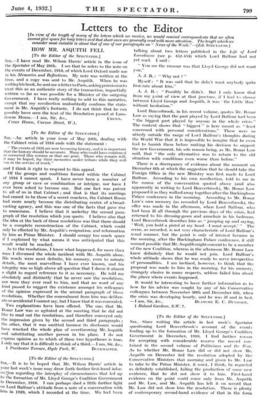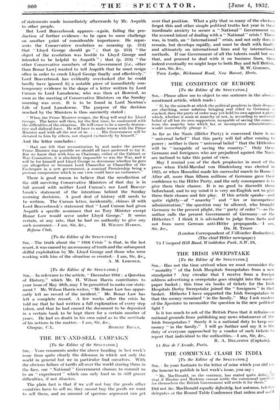[To the Editor of the Scilemton.]
SIR,—Since writing the article in last week's Spectator questioning Lord Beaverbrook's account of the events leading up to the formation of Mr. Lloyd GeOrge's Coalition Government in December, 1916, I find further reason for accepting with considerable reserve the record con- tained in the second volume of Politicians and the War. As to whether Mr. Boner Law did or did not show Mr. Asquith on December 3rd the resolution adopted by the Conservative Ministers that morning and given to Mr. Law to take to the Prime Minister, it must, I think, be regarded as definitely established, failing the production of some new evidence, that he did not show it to him. First-hand evidence on the point could come only from Mr. Asquith and Mr. Law, and Mr. Asquith has left it on record that Mr. Law did not show him the resolution. There is plenty of contemporary second-hand evidence of that in the form
of statements made immediately afterwards by Mr. Asquith to other people.
But Lord Beaverbrook appears—again, failing the pro- duction of further evidence—to be open to some challenge on another point of considerable importance. He repre- sents the Conservative resolution as meaning (p. 212) tlutt Lloyd George should go " ; that (p. 213) " the object of the resolution was hostile to Lloyd George and intended to be helpful to Asquith " ; that (p. 213) " the
oilier Conservative members of the Government other than Bonar Law] wanted to tell Asquith that he must resign office in order to crush Lloyd George finally and effectively." Lord Beaverbrook has evidently overlooked (for he could loudly have ignored it) a notable piece of immediately con- temporary evidence hi the shape of a' letter written by Lord Curzon to Lord Lansdowne, who was then at Bowood, as soon as the meeting of Conservative Ministers on the Sunday morning was over. It is to be found. in Lord Newton's Life of Lord Lansdowne. The purpose of the decision reached by the Ministers is thus succinctly stated :
" When the Prime Minister resigns, the King will send for Lloyd George. The latter will then, for the first time, bo confronted with the difficulties of the situation. He will cense to be a merely destruc- tive and disloyal force. He will have to make terms with the Prime Minister and with all the rest of us. . . . His Government will be dictated to him by others, not shaped exclusively by himself."
And the letter concludes : " Had one felt that reconstitution by and under the present Prime Minister was possible we should all have preferred to try it. But we know that with him as Chairman, either of the Cabinet or War Committee, it is absolutely impossible to win the War, and it will be for himself and Lloyd George to determine whether he goes out altogether or becomes Lord Chancellor or Chancellor of the Exchequer in a new government., a nominal Premiership being a protean compromise which in our view could have no endurance."
There is good reason to believe that the recollection of the still surviving Conservative Ministers of that day is in full accord with neither Lord Curzon's nor Lord Beaver- brook's statement of the intentions behind the Sunday morning decisions. A good deal of history still needs to be written. The Curzon letter, incidentally, chimes ill with Lord Beaverbrook's statement that " Lord Curzon had given Asquith a specific assurance that no Tory Minister except Bonar Law would serve under Lloyd George." It seems certain, at any rate, that lie had no authority to give any





































 Previous page
Previous page